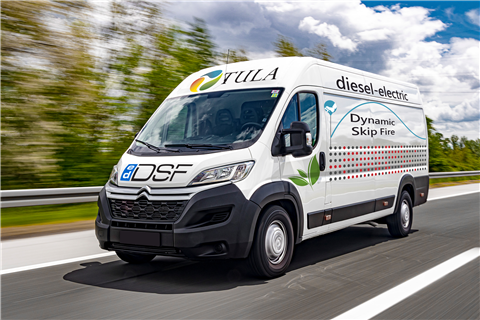Tula demos diesel Dynamic Skip Fire for hybrids
28 June 2021
 Tula Technology recently completed a study that its diesel Dynamic Skip Fire technology can delliver significant improvements in emissions performance and fuel economy in light commercial hybrid vehicles.
Tula Technology recently completed a study that its diesel Dynamic Skip Fire technology can delliver significant improvements in emissions performance and fuel economy in light commercial hybrid vehicles.
Tula Technology, Inc., a Silicon Valley provider of advanced software controls, has released the findings of a recent simulation study to evaluate the efficacy of its diesel Dynamic Skip Fire (DSF) cylinder decativation technology for mild hybrid diesel vehicles. According to the study the DSF system reduced CO2 emissions in a 2.3 L, four-cylinder 48 V light commercial vehicle in challenging real-world conditions. When Tula’s software strategies were implemented, an additional 11% of CO2 was eliminated compared to existing hybrid powertrains. The CO2 reduction can be achieved at a cost of $235 per vehicle, the company said.
“We created a synergistic technology by combining mild hybrid powertrain controls with our diesel Dynamic Skip Fire, which has proven to be very effective at reducing NOX (nitrogen oxides) and CO2 (carbon dioxide) emissions in heavy duty trucks,” said R. Scott Bailey, president and CEO of Tula Technologies. “We call it electrified diesel Dynamic Skip Fire, or edDSF, and it will help manufacturers of light commercial vehicles meet challenging NOX standards in a cost-effective manner. Equally significant, our product performs even better in tougher real-world conditions than under test cycles.”
Tula’s DSF system is an advanced cylinder deactivation control strategy engineered to deactivate individual engine cylinders based on engine torque demands. The original DSF has been applied in more than a million vehicles in the passenger car segment since 2018, Tula said, and more recently, demonstrated significant NOX reduction in a study with Cummins involving a 15 L engine used in a heavy-duty truck application.
The findings of the latest study indicatethat electrified diesel Dynamic Skip Fire (edDSF) can significantly reduce CO2 output through the synergies created by pairing a hybrid system with DSF. It also provides a means to achieve upcoming low-NOX emissions targets, the company said. Fuel savings are an additional benefit of edDSF compared to other emissions management technologies that typically require burning additional fuel to produce the heat required to decrease tailpipe emissions. Tula said tge economics of edDSF indicate that over a six-month period, an urban delivery vehicle equipped with edDSF will save enough in fuel expenses to recoup the costs associated with Tula’s technology.
“With edDSF, we are offering a leading-edge solution to help meet the tight deadline the EU has set to reduce emissions,” Bailey said. “And for vehicle powertrain development, 2026 is just around the corner.
“edDSF is one of the many patented technologies in Tula’s portfolio that help improve the environment by increasing the efficiency of engines and motors while reducing harmful emissions.”
STAY CONNECTED




Receive the information you need when you need it through our world-leading magazines, newsletters and daily briefings.
POWER SOURCING GUIDE
The trusted reference and buyer’s guide for 83 years
The original “desktop search engine,” guiding nearly 10,000 users in more than 90 countries it is the primary reference for specifications and details on all the components that go into engine systems.
Visit Now
CONNECT WITH THE TEAM









